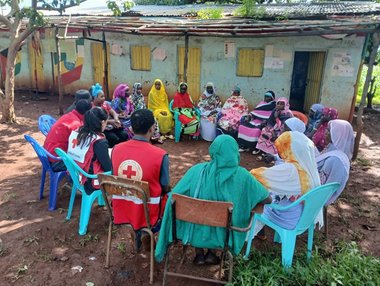Background The Benishangul Gumuz region has high prevalence rates of Female Genital Mutilation/Cutting - FGM/C (62.9%) and early marriage (50%) among women aged 15-49, according to a 2016 survey. FGM/C often occurs before the age of 10, and early marriage pulls girls out of school, perpetuating gender inequality. Given its effectiveness in altering social norms, the Ethiopian Red Cross Society - ERCS adopted Community Conversation Facilitation - CCF as a core strategy to address these issues. The project collaborates with local government officials, religious leaders, health workers, and community influencers.
Methodology The CCF approach follows a structured, multi-phase process:
- Community Selection: Kebele-level communities are selected based on population size and infrastructure.
- Facilitator Selection and Training: Six key facilitators, including community and religious leaders, undergo a 5-day residential training on harmful practices, hygiene, and facilitation skills.
- Community Sessions: 60 community members (30 men and 30 women) are chosen for bi-weekly sessions, which prioritize harmful traditional practices (HTPs) and discuss FGM/C and early marriage.
- By-law Development: Communities develop and validate by-laws aimed at eliminating HTPs.
- Certification and Declaration: Communities that eliminate FGM/C and early marriage for two years receive certification and hold public declarations of their new status.
Additional components like mobile cinema, radio programs, and school-based interventions complement the CCF process, engaging broader audiences and sustaining behavior change.
Results and Impact The project has led to significant shifts in community attitudes, social norms, and practices:
- Attitudinal Shifts: Religious leaders refuted religious justifications for FGM/C, while men recognized its negative impact on marriage. Some women expressed regret over having undergone FGM/C.
- Social Norm Changes: The belief that FGM/C enhances marriageability has weakened. Circumcisers, once highly respected, are now discouraged. Gender roles have shifted as seating arrangements in sessions encourage equal participation.
- Reduction in Harmful Practices: Reports indicate a decline in FGM/C and early marriage, with some communities achieving certification as FGM/C-free.
- Increased Reporting and Engagement: Youth are actively informing authorities of impending FGM/C or early marriage, and community members report violations more readily.
- Broader Gender and Health Impacts: The project promoted improved menstrual hygiene, reduced domestic violence, and empowered women to participate in discussions.
- Legal and Administrative Changes: Community by-laws were enacted to curb FGM/C, while FGM/C prevention was integrated into healthcare and law enforcement.
The project has demonstrated its potential to promote gender equality, health, and community cohesion beyond the immediate issues of FGM/C and early marriage.
Challenges and Lessons Learned Challenges:
- Operational and Logistical Issues: Participants often struggled with punctuality, and outdoor meeting spaces were affected by weather and noise.
- Cultural Resistance: Initial pushback arose due to misconceptions about the project’s religious alignment and skepticism about challenging entrenched practices.
- Gender Imbalance: Fewer women were chosen as CCF facilitators, reducing female leadership in these dialogues.
- Sustainability and Coverage: Key personnel turnover (e.g., Kebele Managers) and limited kebele coverage hampered continuity and broader impact.
Lessons Learned:
- Religious and Cultural Sensitivity: Engaging religious leaders and scholars helped address resistance by debunking religious justifications for FGM/C.
- Multi-faceted Interventions: Combining CCF with mobile cinema, radio, and other media proved more effective than relying on one method alone.
- Inclusive Participation: Alternating seating of men and women in sessions challenged traditional gender roles, promoting open dialogue.
- Government Collaboration: The success of the project was strengthened through partnerships with local government and law enforcement, fostering sustainability.
Conclusion The Community Conversation Facilitation approach in Benishangul Gumuz has successfully challenged deep-seated social norms around FGM/C and early marriage. By fostering dialogue, community-led by-laws, and public declarations of FGM/C-free status, the project has prompted significant shifts in attitudes and practices. Broader impacts include enhanced gender equality, health improvements, and more active community participation.
While challenges remain, particularly in ensuring sustainability and broader reach, the CCF approach represents a promising model for scaling up in other regions. Its integration with government structures and sensitivity to cultural and religious contexts further strengthens its potential for widespread adoption in combating harmful traditional practices.


